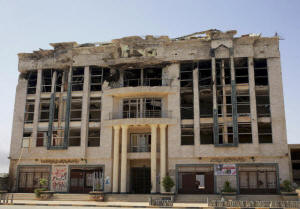|
Germany, France hold back NATO, EU
ambitions in Libya
 Send a link to a friend
Send a link to a friend
[May 25, 2016]
By Robin Emmott
 BRUSSELS (Reuters) - Europe's bold
intentions to support Libya's new U.N.-backed government are faltering
as France and Germany resist a bigger role to rebuild the failed state,
scarred by the West's 2011 air campaign to help topple dictator Muammar
Gaddafi. BRUSSELS (Reuters) - Europe's bold
intentions to support Libya's new U.N.-backed government are faltering
as France and Germany resist a bigger role to rebuild the failed state,
scarred by the West's 2011 air campaign to help topple dictator Muammar
Gaddafi.
The European Union and NATO have said they stand ready to help the
unity government in Tripoli, if requested, to combat smugglers
sending migrants into the Mediterranean toward Europe. Tripoli, for
its part, faces a threat from Islamic State fighters who exploited
past conflict between rival governments to extend their power.
In a letter, Libyan Prime Minister Fayez Seraj sent a broad request
for security training, but now Germany and France want the United
Nations to move first, something Russia is unlikely to support
because it feels the West went too far in 2011.
Germany has suggested that the NATO alliance may need an invitation
from the European Union to help in Libya.
"Europeans now have what they asked for, namely a unity government
ruling from the capital," said Mattia Toaldo, a Libya expert at the
European Council on Foreign Relations. "They should take care not to
burden it with unrealistic demands, from ending the migrant crisis
to defeating Islamic State."
Germany is wary of a long-term commitment, scaling back the language
in a statement by European Union foreign ministers this week by
insisting the bloc seeks U.N. Security Council approval to stop arms
trafficking even on the high seas, diplomats said.
 France sent special forces and intelligence commandos to conduct
covert operations against Islamic State in Libya, Le Monde reported
in February. But French diplomats in Brussels are more cautious
about a big NATO role, despite a warning last month from EU foreign
policy chief Federica Mogherini that some 450,000 refugees in Libya
could flee to Europe.
Deployment of NATO combat troops appears out of the question.
"We are looking at a support role, one that is low profile," said a
senior French official involved in Libya policy. "The risks are very
real and our resources modest."
The remarks contrast with gathering momentum a month ago at EU and
NATO headquarters in Brussels and a special dinner of EU foreign and
defense ministers in Luxembourg in which Libyan maritime and
security missions were on the table.
"The situation is apparently not grave enough for us to act," said a
senior NATO diplomat. "We need a real crisis."
Just 480 kilometers (300 miles) from Europe's coast, Libya's slide
into anarchy over the past five years has made it an outpost for
Islamic State militants and a staging post for sub-Saharan African
migrants aided by traffickers.
But the failure of the West's 2011 intervention still weighs on
Western officials, even as the United States urges the Europeans to
take a bigger role in securing its neighborhood.
[to top of second column] |

A building damaged during clashes between military forces loyal to
Libya's eastern government and the Shura Council of Libyan
Revolutionaries, an alliance of former anti-Gaddafi rebels who have
joined forces with the Islamist group Ansar al-Sharia, is seen in
Benghazi, Libya April 15, 2016. REUTERS/Esam Omran Al-Fetori/File
Photo

"Washington tells us Europe's southern border ends in the Sahara,
not in the Mediterranean," said an EU defense official.
"SECURITY VACUUM"
Britain and the United States want a much bigger role for both NATO
and the European Union. U.S. Secretary of State John Kerry has urged
NATO to link up with the EU's naval mission "Sophia" in the
Mediterranean to tackle smugglers.
Lawmakers in Britain say the EU's naval mission in the Mediterranean
is too limited to have an impact on smugglers, as it is too far out
to destroy boats, catch traffickers or head off migrants trying to
reach Europe by sea from Libya.
"A mission acting only on the high seas is not able to disrupt
smuggling networks, which thrive on the political and security
vacuum in Libya, and extend through Africa," a British parliamentary
report said this month.
Alain Le Roy, the secretary general of the EU's foreign service,
defended the Sophia mission, saying that more than 80 traffickers
had been arrested and up to 200 boats destroyed.
EU foreign ministers have approved training of Libya's navy and
coast guard in international waters. Sophia's chief, Italian Rear
Admiral Enrico Credendino, told La Repubblica on Wednesday the coast
guard could be trained in 14 weeks.
On the ground, the United States and Italy, Libya's former colonial
power, are leading calls for action and Rome is willing to send
around 5,000 personnel to help the country. Washington is developing
military options including deploying U.S. special forces against
Islamic State militants.

Germany does not want its personnel on Libyan soil but is willing to
revive an EU border guards program in Tunisia.
(Reporting by Robin Emmott; editing by Ralph Boulton)
[© 2016 Thomson Reuters. All rights
reserved.]
Copyright 2016 Reuters. All rights reserved. This material may not be published,
broadcast, rewritten or redistributed. |